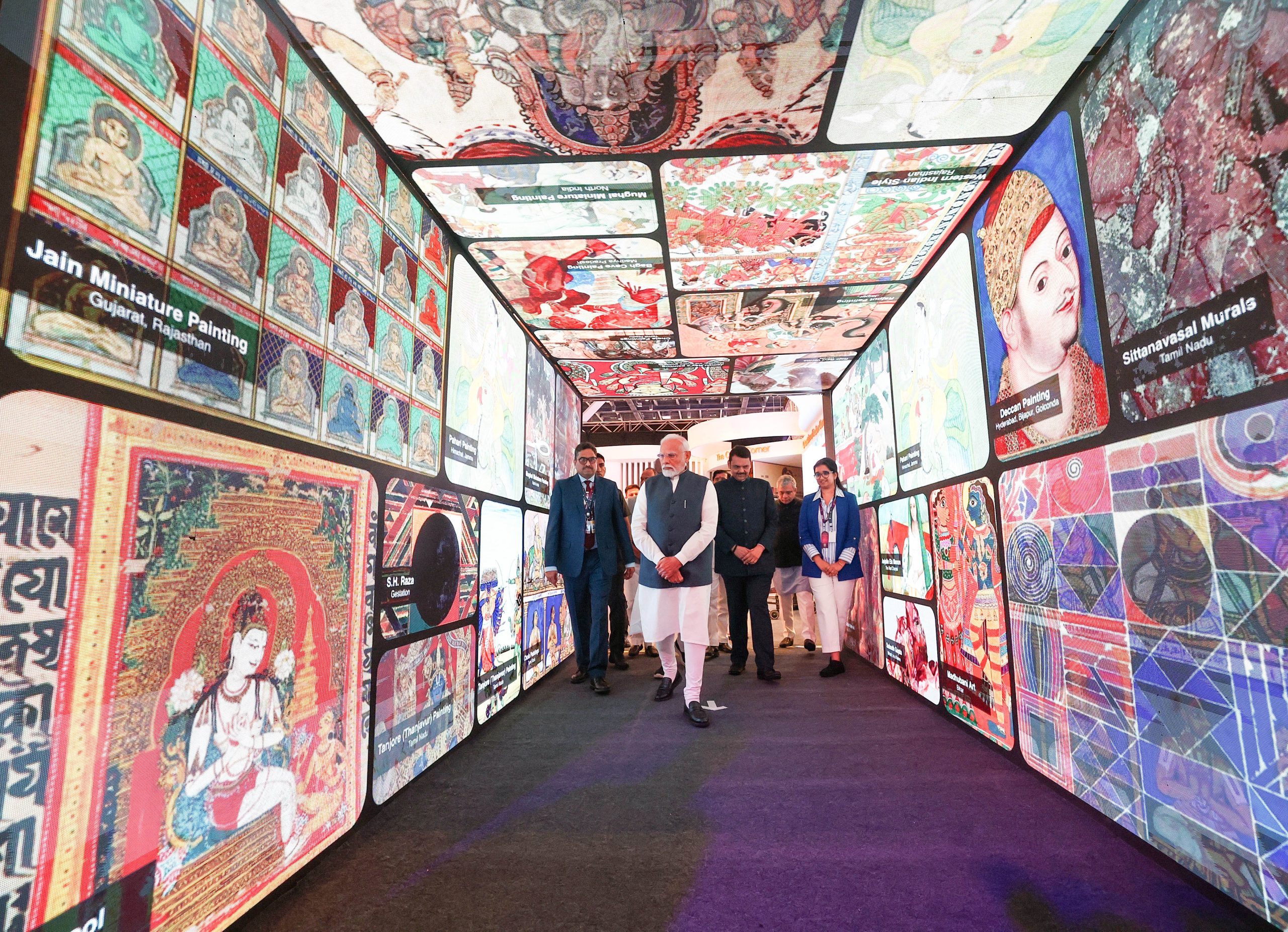At the WAVES Summit earlier this month, the icons of an industry that once framed itself as the voice of India stood still for a moment, not on a set, not in a scene, but in real time. Khans and Kapoors, studio heads and screenwriters, streaming moguls and old-guard directors — all of them under one roof, hosted not by a production house, but by a government they had, not long ago, considered creatively toxic. The man whose rise to power had been declared the death of free speech in India was now sharing the stage with them, gently inviting creators to tell the story of Bharat to the world — and in doing so, nudging them to first listen to Bharat themselves.
But WAVES is not the story. It is only the stage.
The real story lies in what led up to this moment: a quiet, sometimes uncomfortable, but wholly inevitable civilisational shift. A rewriting of the grammar of Indian storytelling. For decades, a small coterie dictated what stories would be told about India — often from the vantage point of metro privilege, Western awards circuits, or elite anxieties. The India that reached our screens was often broken, mocked, exoticised, or aestheticised. The India of slums, scams, and spiritual contradictions. Tradition was treated as burden, faith as fanaticism, and the village as either comic relief or backwardness. For years, audiences were fed a single narrative: that they had no choice but to accept what was being offered — that they were too unsophisticated to expect more.
But Bharat — patient, poetic Bharat — was listening. Watching. And then it chose.
It began, as all awakenings do, not with fireworks, but with quiet exits. Audiences stopped showing up. The Friday buzz started fading. And then, the economy of choice — powered by the democratisation of platform thanks to social media — transformed the whole content consumption experience. Viewers discovered that they were no longer bound to whatever landed in the multiplex. They had access to stories that hadn’t passed through the old gatekeepers. Stories that didn’t need to beg for distribution or approval. Stories that simply spoke — in dialects they understood, with values they recognised, and emotions they had lived.
Narrative Reimagining: From India to Bharat, there has been a change in the stories we tell, the heroes we celebrate, and the India we portray.
The Stories We Tell. The Heroes We Celebrate. The India We Portray. In the last decade, something subtle yet seismic has shifted in Indian cinema. We are no longer merely telling stories about India. We are beginning to speak as Bharat.
For too long, the global gaze shaped our storytelling — a cinematic self-consciousness that chased validation from Western film festivals or mimicked Western narrative forms. The India that appeared on screens abroad was either exotic and spiritual or broken and begging for sympathy — poverty porn, partition pain, or palace love stories.
But today, there’s a slow, confident move from India-as-imagined-by-others to Bharat-as-felt-by-itself. We are witnessing a shift from victimhood to valour — where the once-forgotten warriors of our soil, from Rani Durgavati to Veer Savarkar, are being reclaimed as cinematic protagonists.
There is a visible shift –
From metro gaze to mandir towns, where stories now unfold in Ayodhya, Kashi, Bastar, and Bhuj, without apology.
From mimicry to myth-making, where homegrown philosophies, epics, and aesthetics are stepping forward as source material, not backdrop.
Cinema is slowly catching up — from mytho-scientific films to historical epics, from women-led entrepreneurship stories to narratives anchored in Kashi, Kedarnath, and Kanyakumari. This is not nostalgia. It is civilisational reclaim. And through cinema — our most powerful export — we are reimagining ourselves and inviting the world to see a new Bharat: rooted, radiant, and ready.
We stopped exporting sympathy. We started inviting the world to witness a civilisation coming into consciousness — not as a wounded past, but as a living, luminous future. Shrinking the colonial-leftist gaze that showcased India as land of suffering, spiritual detachment, and economic decay, we have slowly and steadily decided to chose civilisational pride over postcolonial pity, and replace cinematic self-pity with cinematic self-respect.
We have now begun to see ourselves not as a country waiting to be explained, but as a civilisation finally choosing how to be shown.
And that is how and why the old guard began to flounder. The industry that had once dictated taste — with its boy-meets-girl montages and designer depression — has found itself gasping. Friday releases have dried up. Cinemas play reruns. Star-studded films have crashed at the box office. Bollywood, as we knew it, is experiencing an identity crisis. And which is why the presence of erstwhile ‘Lords’ of the industry at the recently concluded WAVES summit in Mumbai is a story in itself.
In 2015, Aamir Khan remarked that his wife no longer felt safe in India — a moment that revealed not just his personal fears, but a deeper cultural disconnect. It wasn’t just about intolerance. It was about entitlement. The idea that cultural authority could be claimed, not earned.
Fast forward to WAVES 2025, and Aamir is back on stage — praising government support, urging for theatres in every corner of India. Not because he changed. But because Bharat did. And he knows it.
The stars are no longer in the sky. They are on the ground. Because their castles have crashed. They now stand at the shore, waiting — not just for a comeback, but for newer waves. Pun very much intended.
WAVES 2025, in that sense, wasn’t just a summit. It was a reckoning. The very actors, studios, and production houses that once scoffed at tradition were now attending a government-backed cultural platform with folded hands. And the irony was not lost on anyone. But this wasn’t revenge. It was realignment.
Prime Minister Modi’s address didn’t speak of censorship or surveillance. He spoke of story. He invoked the Natyashastra. He reminded us that even our gods sing and dance. He urged creators to dream big, to tell the one billion untold stories of Bharat to the world.
No diktats. Just direction. A gentle, civilisational nudge. Because Bharat, long silenced, is now narrating. It is no longer the subject of someone else’s script. It is the sutradhar — the narrator, the conscience, the cultural compass. It is not waiting to be validated. It is speaking in its own rhythm, its own language, its own light.
The world doesn’t need a rebranded India. It needs to meet Bharat — as it has always been, and as it is now willing to show itself. The script is being rewritten, many many frames at a time.















